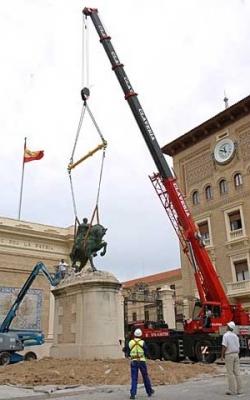%%rimage[The Church shifts from dictator's partner to special interest group in a democracy]=X845_727_ESFrancoBye24_t55.jpg The Church shifts from dictator's partner to special interest group in a democracy
With the death of Franco, the Church had to revise his concordat and accept the loss of its religious monopoly. However, the new constitution was arranged so as to still give the Church a special status. (And no wonder, since the concordat, though signed later, was negotiated at the same time.) It proved easier to remove Franco's statue than the Church privileges that he helped entrench.
Excerpts from Paul Christopher Manuel and Margaret Mott,
"Une Messe est Possible": The Imbroglio of the Catholic Church in Contemporary Latin Europe,
Center for European Studies Working Paper No. 113, (2004), pp. 9-12. http://www.ces.fas.harvard.edu/publications/docs/pdfs/ManuelMott.pdf
 The 1953 Concordat signed with the Vatican began with the following decree: "The Catholic, Apostolic and Roman religion, being the only religion of the Spanish nation, enjoys rights and prerogatives which are its due conforming to Divine and Canon Law." The Concordat granted the state the right to intervene in the alteration of ecclesiastical jurisdictions, including the appointment of bishops; this privilege became increasingly problematic as Rome sided more with the concerns of labourers and against the repressive policies of the regime.
The 1953 Concordat signed with the Vatican began with the following decree: "The Catholic, Apostolic and Roman religion, being the only religion of the Spanish nation, enjoys rights and prerogatives which are its due conforming to Divine and Canon Law." The Concordat granted the state the right to intervene in the alteration of ecclesiastical jurisdictions, including the appointment of bishops; this privilege became increasingly problematic as Rome sided more with the concerns of labourers and against the repressive policies of the regime.
Recognised as a "perfect society" and a juridical personality, the Spanish Church received tax exemptions and government subsidies for salaries and the maintenance of cathedrals, parishes, religious orders, and other ecclesiastical institutions. Besides the financial benefits, the Church controlled family matters: Only a Catholic priest could consecrate a marriage; divorce, contraception and abortion were prohibited; and Catholic religious education was obligatory. The Spanish Church held the right to censure all educational material, while its own publications were free from state censorship.
After Vatican II, the Spanish Church became more alienated from the regime. Younger priests, who were more familiar with the poverty of the working class than with civil war-era religious persecutions by anticlerical republican forces, took up the demands of urban pastors. Ecclesiastical base communities appeared in poor and working class neighbourhoods in Madrid and other large cities. As early as 1960, younger clergy, particularly in the Basque region, protested the close ties between the hierarchy and the Franco regime. [...]
[The democratic transitions in Iberia in the 1970s brought an abrupt end to the authoritarian model in Spain and Portugal and they ushered in a new democratic model of church-state relations.] Under the new democracies, in principle, at least, all religious organisations were granted equal rights, [...] although the Spanish Church has managed to negotiate some special privileges. [...]
On its face, the Spanish Constitution of 1978 has also severed all ties between the state and the Church. Section 16, paragraph 3, declares, "No religion shall have a state character," Still, the Roman Catholic Church is the only religion to achieve some amount of formal constitutional recognition, as stated in the very next sentence: "The public authorities shall take into account the religious beliefs of Spanish society and shall consequently maintain appropriate cooperation with the Catholic Church and other confessions." One of the places where "appropriate cooperation" is most visible is in the matter of education. Paragraph 3 of section 27 guarantees the "right of parents to ensure that their children receive religious and moral instruction in accordance with their own convictions," a guarantee posted on the walls of many a parish [...] a service [!] that the state continues to pay for.







